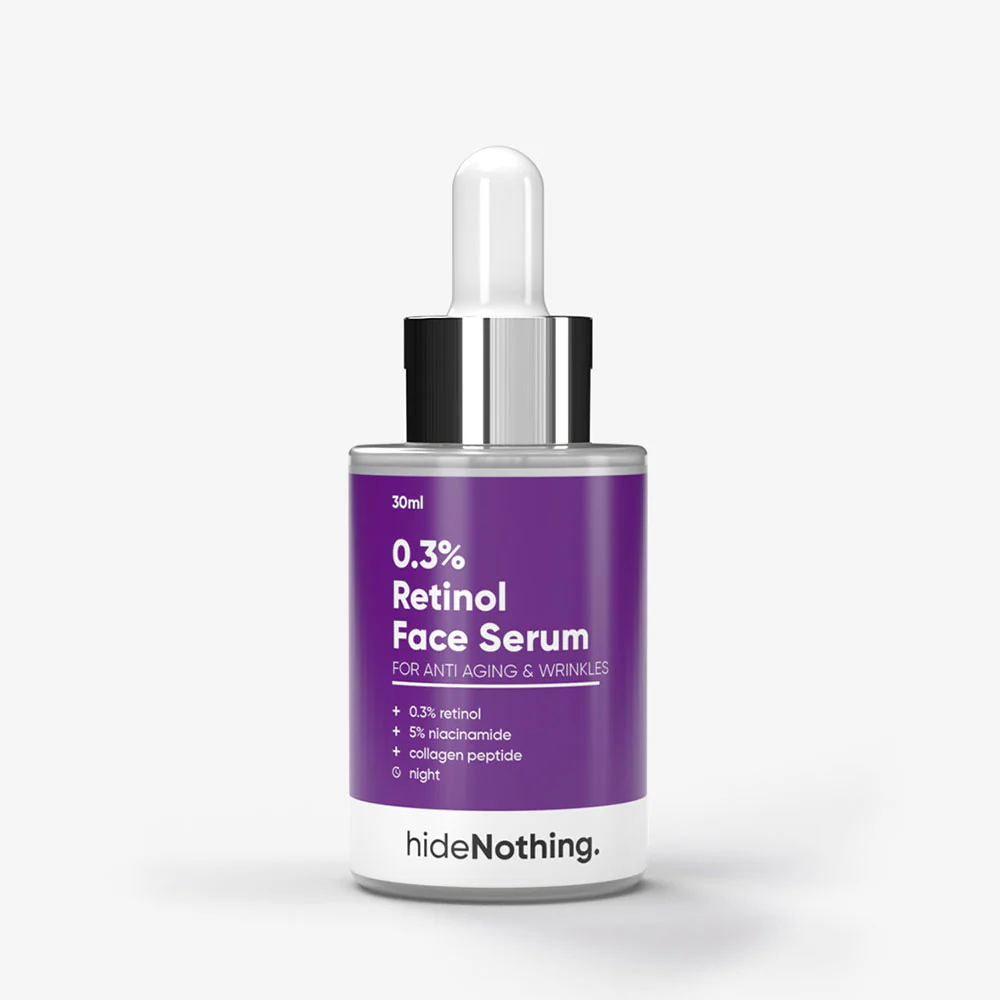Introduction to Retinol Face Serum
Retinol, a derivative of vitamin A, is a powerful retinol serum skincare ingredient known for its anti-aging and skin-rejuvenating properties. It has gained popularity as a go-to solution for wrinkles, fine lines, acne, and overall skin texture improvement. Available in various formulations, a retinol serum offers concentrated benefits, making it a potent addition to any skincare routine.
In this guide, we’ll cover the benefits, usage, precautions, and things to look for in a retinol face serum.
1. Benefits of Retinol Face Serum
Retinol offers numerous benefits for your skin. Here’s what it can do:
- Reduces Fine Lines and Wrinkles: Retinol stimulates collagen production, essential for skin elasticity, helping to smooth out fine lines and wrinkles over time.
- Improves Skin Texture: By increasing cell turnover, retinol can make your skin appear smoother and softer.
- Clears Acne and Reduces Pore Size: Retinol helps clear clogged pores and reduce their appearance, making it a popular choice for acne-prone skin.
- Evens Out Skin Tone: It works to diminish dark spots, hyperpigmentation, and sun damage for a more even skin tone.
2. How Retinol Works on the Skin
Retinol works by accelerating the skin’s cell renewal process. When applied, it encourages older, damaged skin cells to shed, allowing fresher skin to surface. It also boosts collagen production, which is vital for maintaining youthful skin.
3. Types of Retinoids
Retinoids come in various strengths and forms, so it’s essential to understand the types to choose the right one for your skin type and needs:
- Over-the-Counter Retinol: Available in lower concentrations, suitable for sensitive skin or those new to retinol.
- Retinaldehyde: Slightly stronger than OTC retinol, this ingredient converts to retinoic acid in the skin, providing similar benefits with less irritation.
- Retinoic Acid (Prescription-Only): The most potent form of retinoid, ideal for advanced skin concerns like deep wrinkles and severe acne.
4. Key Ingredients to Look For in a Retinol Serum
A high-quality retinol serum often contains other beneficial ingredients to enhance results and minimize potential irritation. Here are a few to consider:
- Hyaluronic Acid: Keeps skin hydrated, helping to counteract the dryness retinol can cause.
- Vitamin C: A powerful antioxidant that can work with retinol to brighten skin and reduce pigmentation.
- Niacinamide: Calms and soothes skin while reducing redness, a common side effect of retinol.
- Peptides: Support collagen production, making retinol more effective at targeting fine lines and wrinkles.
5. How to Use Retinol Serum in Your Skincare Routine
Introducing retinol into your skincare routine requires a strategic approach:
- Start Slowly: Begin with a small amount, using the serum 1-2 times a week, and gradually increase frequency as your skin builds tolerance.
- Use at Night: Retinol can make your skin more sensitive to sunlight, so it’s best applied in the evening.
- Moisturize and Hydrate: Follow up with a good moisturizer to prevent dryness and irritation.
- Apply Sunscreen Daily: Retinol increases skin sensitivity to UV rays, so SPF 30 or higher is a must.
6. Potential Side Effects and How to Manage Them
While retinol is highly effective, it can cause some best retinol serum in pakistan side effects, especially when first introduced to your routine. Common side effects include:
- Dryness and Flaking: Retinol can strip moisture, causing dryness and flakiness.
- Redness and Irritation: Especially common for sensitive skin, it can lead to redness.
- Sensitivity to Sun: Increased UV sensitivity necessitates daily sunscreen use.
To minimize these side effects, consider starting with a lower concentration or choosing a retinol serum formulated for sensitive skin.
7. What to Consider Before Buying Retinol Face Serum
Before purchasing, keep these factors in mind:
- Concentration Level: If you’re new to retinol, start with a lower concentration (0.1%–0.25%) and build up.
- Skin Type Compatibility: Look for serums designed for your skin type; some retinol serums cater specifically to oily, dry, or sensitive skin.
- Packaging: Retinol is sensitive to light and air, so opt for serums in opaque or air-tight containers to preserve potency.
- Additional Active Ingredients: Consider any additional active ingredients in the serum, such as hyaluronic acid or vitamin C, to enhance its effects.
8. FAQs About Retinol Face Serum
- How long does it take to see results? Typically, it can take anywhere from 4-12 weeks to notice visible changes in the skin.
- Can I use retinol with other active ingredients? Some ingredients, like AHA/BHAs, can increase irritation. It’s best to alternate or consult a dermatologist if you’re using multiple actives.
- Is retinol safe for all skin types? While beneficial for many, those with extremely sensitive or compromised skin might need a gentler alternative, like retinaldehyde.
9. Common Myths About Retinol
Let’s debunk some popular myths surrounding retinol:
- Myth 1: Retinol causes your skin to thin out. In reality, retinol promotes collagen production, which thickens and strengthens the skin.
- Myth 2: Retinol shouldn’t be used with vitamin C. While it’s often recommended to use them at different times, combining retinol with vitamin C can be effective if tolerated by your skin.
10. Best Practices for Long-Term Use of Retinol
Consistency and patience are essential when using retinol. To maintain results:
- Continue Use After Initial Results: Stopping can lead to skin returning to its original state.
- Adjust Based on Skin’s Needs: Depending on how your skin responds, you may need to switch to a stronger or milder product over time.
- Consult a Dermatologist: For personalized advice, especially if you’re dealing with sensitive skin or specific concerns like severe acne.
Conclusion: Is Retinol Face Serum Right for You?
Retinol face serum can be a game-changer for many skin concerns, from aging to acne and uneven skin tone. With the right concentration, ingredients, and application technique, it offers significant benefits with minimal side effects. However, the key to success with retinol is patience, consistency, and proper use.
